Campbell,C.J. and Laherrere(真中のeの頭に`),J.H.(1998): The
end of cheap oil. Scientific American, March 1998,
278(3),78-83.
『安い石油時代の終焉』
C.J.キャンベル・J.H.ロレール(1998):安い石油がなくなる.日経サイエンス、1998年6月号、20-29.
Global production of conventional oil will begin to decline
sooner than most people think, probably within 10 years
『(Introduction)
In 1973 and 1979 a pair of sudden price increases rudely awakened
the industrial world to its dependence on cheap crude oil. Prices
first tripled in response to an Arab embargo and then nearly doubled
again when Iran dethroned its Shah, sending the major economies
sputtering into recession. Many analysts warned that these crises
proved that the world would soon run out of oil. Yet they were
wrong.
Their dire predictions were emotional and political reactions;
even at the time, oil experts knew that they had no scientific
basis. Just a few years earlier oil explorers had discovered enormous
new oil provinces on the north slope of Alaska and below the North
Sea off the coast of Europe. By 1973 the world had consumed, according
to many experts' best estimates, only about one eighth of its
endowment of readily accessible crude oil (so-called conventional
oil). The five Middle Eastern members of the Organization of Petroleum
Exporting Countries (OPEC) were able to hike prices not because
oil was growing scarce but because they had managed to corner
36 percent of the market. Later, when demand sagged, and the flow
of fresh Alaskan and North Sea oil weakened OPEC's economic stranglehold,
prices collapsed.
The next oil crunch will not be so temporary. Our analysis of
the discovery and production of oil fields around the world suggests
that within the next decade, the supply of conventional oil will
be unable to keep up with demand. This conclusion contradicts
the picture one gets from oil industry reports, which boasted
of 1,020 billion barrels of oil (Gbo) in “Proved” reserves at
the start of 1998. Dividing that figure by the current production
rate of about 23.6 Gbo a year might suggest that crude oil could
remain plentiful and cheap for 43 more years - probably longer,
because official charts show reserves growing.
Unfortunately, this appraisal makes three critical errors. First,
it relies on distorted estimates of reserves. A second mistake
is to pretend that production will remain constant. Third and
most important, conventional wisdom erroneously assumes that the
last bucket of oil can be pumped from the ground just as quickly
as the barrels of oil gushing from wells today. In fact, the rate
at which any well - or any country - can produce oil always rises
to a maximum and then, when about half the oil is gone, begins
falling gradually back to zero.
From an economic perspective, when the world runs completely
out of oil is thus not directly relevant: what matters is when
production begins to taper off. Beyond that point, prices will
rise unless demand declines commensurately.
Using several different techniques to estimate the current reserves
of conventional oil and the amount still left to be discovered,
we conclude that the decline will begin before 2010.』
Digging for the true numbers
Unproved reserves
Diminishing returns
Predicting the inevitable
Smoothing the peak
In the down side
The Authors
Further reading
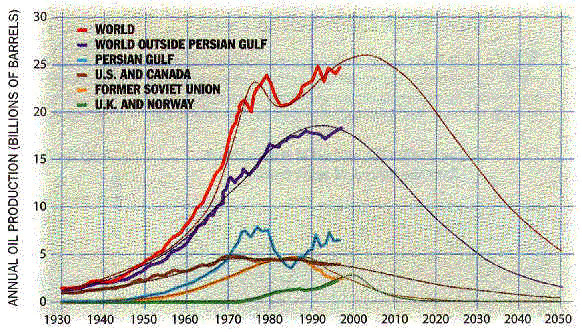
GLOBAL PRODUCTION OF OIL both conventional and unconventional
(red), recovered after falling in 1973 and 1979. But a more permanent
decline is less than 10 years away, according to the authors'
model, based in part on multiple Hubbert curves (lighter lines).
U.S. and Canadian oil (brown) topped out in 1972; production
in the former Soviet Union (yellow) has fallen 45 percent since
1987. A crest in the oil produced outside the Persian Gulf region
(purple) now appears imminent.
〔Campbell,C.J. and Laherrere(真中のeの頭に`),J.H.(1998):
The
end of cheap oil. Scientific American, March 1998,
278(3),78-83.から〕 |
『How much oil is left to find?
We combined several techniques to conclude that about 1,000
billion barrels of conventional oil remain to be produced.
- First, we extrapolated published production figures for older
oil fields that have begun to decline. The Thistle field off
the coast of Britain, for example, will yield about 420 million
barrels (a).
年間生産量(縦軸)−累積生産量(横軸)曲線から、年間生産量がゼロになる時の累積生産量をもとに、既存の油田の残存埋蔵量の推定を行う。
- Second, we plotted the amount of oil discovered so far in
some regions against the cumulative number of exploratory wells
drilled there. Because larger fields tend to be found first-they
are simply too large to miss- the curve rises rapidly and then
flattens, eventually reaching a theoretical maximum: for Africa,
192 Gbo. But the time and cost of exploration impose a more practical
limit of perhaps 165 Gbo (b).
累積発見量(縦軸)−試掘井の合計数(横軸)曲線から、累積発見量が飽和する量をもとに未発見資源量の将来予測を行う。
- Third, we analyzed the distribution of oil-field sizes in
the Gulf of Mexico and other provinces. Ranked according to size
and then graphed on a logarithmic scale, the fields tend to fall
along a parabola that grows predictably over time (c). (Interestingly,
galaxies, urban populations and other natural agglomerations
also seem to fall along such parabolas.)
油田の初期埋蔵量(縦軸)−新油田の数(横軸)曲線【両対数グラフ】から、将来発見される油田の規模を予測する。
- Finally, we checked our estimates by matching our projections
for oil production in large areas, such as the world outside
the Persian Gulf region, to the rise and fall of oil discovery
in those places decades earlier (d).
石油生産量の変化を示す理論モデル(ハバート曲線)を作成し、実際の石油生産量の推移と比較する。』
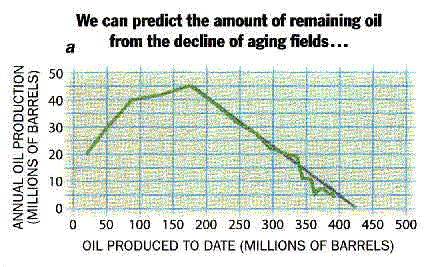
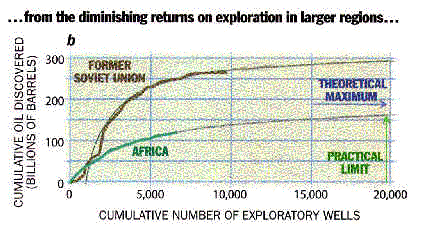
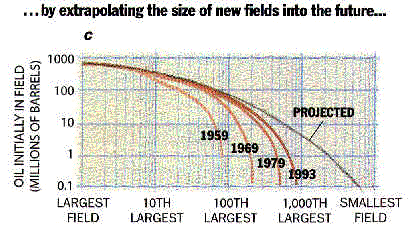
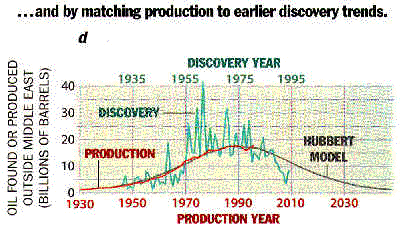
〔Campbell,C.J. and Laherrere(真中のeの頭に`),J.H.(1998):
The
end of cheap oil. Scientific American, March 1998,
278(3),78-83.から〕 |
【楽観論の論説】
- 地球の辺境の地には膨大な石油がまだ発見されずに眠っている。
→現実的にはほとんどありえない。深海底と両極地域は本格的な探査がなされていないが、高精度の探査などから、油田は期待されない。
- 採掘技術の進歩によって、これまでより石油をたくさん油田から採掘できる。
→採掘技術の進歩によって石油生産の減退期の到来を、ある程度先延ばしできるだろうが、新技術の導入に伴うリスクなどからあまり期待できない(先端技術の出る幕がない)。
また、埋蔵量の見積りの中には既に将来の技術革新による回収率の増加が先取りして織り込まれている。
- 未開発の状態で膨大な「非在来型」の石油資源が眠っている。
→在来型石油を代替することは理論的には可能だが、そのための時間と資金が切迫している。また、非在来型石油資源の開発には、周辺地域の環境悪化が伴い、そおれへの対応が必要。
戻る




